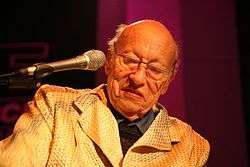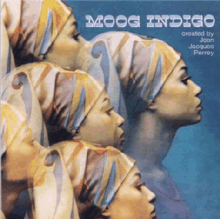Jean-Jacques Perrey
Jean-Jacques Perrey (French: [pɛʁɛ]; 20 January 1929 – 4 November 2016) was a French electronic music producer and was an early pioneer in the genre. He was a member of the electronic music duo Perrey and Kingsley.[1]
Jean-Jacques Perrey | |
|---|---|
 Perrey at a concert in 2006 | |
| Background information | |
| Birth name | Jean Leroy |
| Born | 20 January 1929 Paris, France |
| Died | 4 November 2016 (aged 87) Morges, Switzerland |
| Genres | |
| Occupation(s) |
|
| Instruments | |
| Years active |
|
| Associated acts | |
| Website | www |
Biography
Perrey was born Jean Leroy in France on 20 January 1929.[2] He was studying medicine in Paris when he met Georges Jenny, the inventor of the Ondioline, a type of electronic keyboard. Quitting medical school, Perrey travelled through Europe demonstrating this precursor of the modern synthesizer. At the age of 30, Perrey relocated to New York, sponsored by Caroll Bratman, who built him an experimental laboratory and recording studio. Here he invented "a new process for generating rhythms with sequences and loops", utilising the environmental sounds of "musique concrète." With scissors, splicing tape, and tape recorders, he spent weeks piecing together a uniquely comic take on the future. Befriending Robert Moog, he became one of the first Moog synthesiser musicians, creating "far out electronic entertainment". In 1965 Perrey met Gershon Kingsley, a former colleague of John Cage. Together, using Ondioline and Perrey's loops, they created two albums for Vanguard — The In Sound from Way Out (1966) and Kaleidoscopic Vibrations (1967). Perrey and Kingsley collaborated on sound design for radio and television advertising. Perrey returned to France, composing for television, scoring for ballet, and continuing medical research into therapeutic sounds for insomniacs.
Perrey's return from obscurity began in 1997, when he started recording in Bordeaux, France, with David Chazam. Their album Eclektronics was first released on vinyl in France only, in 1998. A CD version of the album was released in the Netherlands on the BASTA label, with several additional tracks added. In 2000 his collaborative CD with Gilbert Sigrist was released. "Circus of Life" was first released as a "library" recording, for TV and radio (France only), then released on Perrey's own PHMP label. 2006 saw the release of the album The Happy Electropop Music Machine on Oglio Records, of Los Angeles, California. The album was a collaboration with musician/arranger Dana Countryman. The two toured the West Coast of America to promote the album. Also in 2006, Perrey began collaborating with producer Luke Vibert for a CD on England's Lo Records: Moog Acid. The result is a blend of retro and modern analogue house synth-pop, encapsulating many genres and the two respective styles of the artists. The CD was released in 2007.[3] Perrey's release Destination Space is also a collaboration with Dana Countryman. The duo performed concerts in New York City and Montreal in October 2008 to promote its release. The album is notable for Perrey's being almost 80 years old when it was released.
In 2015–2016, Perrey became friends with Belgian-born Australian multi-instrumentalist and singer-songwriter Wouter de Backer (known professionally as Gotye). De Backer worked with Perrey to preserve his recorded legacy. After purchasing two vintage Ondiolines (an electronic keyboard closely associated with Perrey), de Backer formed the Ondioline Orchestra in New York. The sextet made their debut performing two shows in tribute to Perrey at National Sawdust, in Brooklyn, on 22 November 2016. Perrey, who lived in Switzerland, had planned to attend the tribute, but died before it took place. In May 2017, de Backer launched a new record label, Forgotten Futures, of which the first release was Jean-Jacques Perrey et son Ondioline, a compilation of rare and previously unreleased Perrey recordings.
On 13 February 2018, de Backer and his Ondioline Orchestra performed Circuit Breakers: Gotye Presents a Tribute to Jean-Jacques Perrey at Roulette's Mixology Festival 2018, in New York. That same year Gotye's Ondioline Orchestra performed Gotye Presents a Tribute to Jean-Jacques Perrey in Australia. The concert won a Helpmann Award in the Contemporary Music category.[4]
Perrey died at the age of 87 on 4 November 2016 from complications of lung cancer.[5][6]
In popular culture
- "Les Canaux de Mars" is used as the primary music throughout episode 12 of the 1972 Japanese television show Thunder Mask, "Cruel! Thunder mask capital punishment." "Les Mysteres du Cosmos" is used throughout episode 13, "At the end of the far away galaxy."
- Perrey co-wrote "The Savers", which was used as the intro theme music to the popular '70s/'80s game show The Joker's Wild from 1972 until 1978, when producers replaced it with a cover version by Hal Hidey for the duration of the show's original run.
- A cover version of "Baroque Hoedown" was the main theme for Disney's Main Street Electrical Parade, beginning in 1972. Disney had licensed it from PolyGram without Perrey's knowledge:
In the 1970s, Walt Disney Productions chose this tune to be the theme for the Electrical Parade. It was extraordinary, I didn't know about it because the publishers said nothing to me. It was by chance, in 1980, that I went there and was so surprised to hear Baroque Hoedown arranged for a full orchestra.
— Jean-Jacques Perrey, text from English subtitle[7]
- Two themes from Perrey, "The Elephant Never Forgets" and "Baroque Hoedown", were used by Mexican writer/comedian "Chespirito" (Roberto Gómez Bolaños) as the opening and closing theme and closing theme for his comedy shows El Chavo and El Chapulín Colorado, respectively. In 2009, the composers sued Mexican multimedia conglomerate Televisa.[8][9] The case was settled in 2010.[10] A previous lawsuit by Vanguard Records was settled, with plaintiff Vanguard receiving a sum of one million dollars in damages for unauthorized use of Perrey's recordings on the Mexican network, without permission or payment.
- Perrey's 1974 moog track "Boys and Girls", on which he collaborated with Gilbert Sigrist, was used for the opening theme of the 1974 anime Hoshi no Ko Poron and the closing credits music in the Nickelodeon cartoon series The Mighty B!

- A cover of Perrey's 1968 song "Mary France" was featured as the closing theme in the Japanese 1987 Famicom video game Yume Kōjō: Doki Doki Panic, later adapted and released globally in 1988 as Super Mario Bros. 2.
- His 1970 song "E.V.A." was sampled by several rap artists, most notably Gang Starr on "Just to Get a Rep" (1991) and House of Pain on "Fed Up (Remix)" (1996).
- In 1996, the rap group Beastie Boys released an instrumental CD titled, as a tribute to Perrey and Kingsley, The In Sound from Way Out!
- In 2010, Perrey's song "Chicken on the Rocks" was used in season 14 episode 3 of the TV Series South Park, "Medicinal Fried Chicken." The song played as Randy Marsh and friends bounced on their oversized testicles while consuming medicinal marijuana. The tune of the song, which derives from the folk song "Chicken Reel", has also appeared as the theme song for Astro Chicken and Ms. Astro Chicken in the Space Quest games by Sierra.
- His 1968 track "The Little Ships" was featured in the viral YouTube video "going to the store"[11] and "The Mexican Cactus" in the sequel "late for meeting".[12]
- Tracks composed by Perrey have been used in later seasons of SpongeBob SquarePants, such as "Borborygmus", used as the primary music throughout the episode "Cuddle E. Hugs," playing at the beginning and end, and each time the character Cuddle E. Hugs (voiced by Jeff Garlin) appears. Perrey's "Bal Campagnard" is also heard when SpongeBob introduces Gary to Cuddle E. Hugs. Perrey's music is also used in the episodes "Karen's Virus", "The Night Patty", and "SpongeBob in RandomLand".
- A theme from Perrey, "Gossipo Perpetuo", has been used in Sweden by the comedians Anders och Måns in their self-titled comedy show on Swedish television.
- In 2016, Perrey and Kingsley's song "Computer in Love" (from their 1966 album) was used on The Simpsons' couch gag (episode "Orange Is the New Yellow").
- Perrey's 1968 song "Brazilian Flower" went viral and became popularly known as the "Rainbow Bunchie Song",[13] along with a looping animated gif.
Ultraman Taro
Many of Perrey's compositions appeared in the 1973 Japanese television show Ultraman Taro:
| Episode Number | Episode Title | Song |
|---|---|---|
| 29 | "Bemstar Resurrected! Taro Absolutely Sacrificed!" | "Les Mysteres du Cosmos" |
| 36 | "Coward! The Breed Cried" | "Musique de l'infini" |
| 43 | "Pickle The Monster With Salt!" | "Music A 7" |
| 43 | "Pickle The Monster With Salt!" | "Le Défilé Des Moustiques" |
| 43 | "Pickle The Monster With Salt!" | "One two two" |
| 43 | "Pickle The Monster With Salt!" | "La Panthere Cosmique" |
| 47 | "The Monster Master" | "A L'Aube De L'An 2000" |
| 48 | "Monster Girl's Festival" | "Music A 7" |
| 48 | "Monster Girl's Festival" | "Moogy-Boogy" |
| 52 | "Steal the Ultra Life!" | "Musique de l'infini" |
Discography
As Perrey and Kingsley
- The In Sound from Way Out! (1966)
- Kaleidoscopic Vibrations: Electronic Pop Music from Way Out (1967)
- Re-Release of 1967 LP: Kaleidoscopic Vibrations: Spotlight on the Moog (1971)
- Incredible Synthesizer (1975; compilation)
As Jean-Jacques Perrey
- Prelude au Sommeil (1957; France only)
- Cadmus, Le Robot de l'Espace (1959; France only)
- Mr. Ondioline (1960; EP)
- Musique Electronique Du Cosmos (1962)
- The Amazing New Electronic Pop Sound of Jean Jacques Perrey (1968)
- The Happy Moog (with Harry Breuer; 1969)
- Moog Indigo (1970)
- Moog Sensations (1971)
- Moog Expressions (1972)
- Quadraphonic Demonstration Album - Program 2 (1972; two themes)
- Moog Generation (1972)
- Moog Mig Mag Moog (1974)
- Moog Is Moog (1977)
- Dynamoog (with Gilbert Sigrist; 1978)
- Kartoonery (1980)
- Good Moog - Astral Animations & Komputer Kartoons (1998; compilation)
- Circus of Life (with Gilbert Sigrist; 1999)
- Eclektronics (with David Chazam; 2000)
- The Happy Electropop Music Machine (with Dana Countryman; 2006)
- Moog Acid (with Luke Vibert; 2007)
- Destination Space (with Dana Countryman; 2008)
- Froots (with Cosmic Pocket; 2010)
- ELA (with David Chazam; 2015)
- Jean-Jacques Perrey et Son Ondioline (2017)
References
- Perrey & Kingsley. Discogs.com, Retrieved on November 5, 2016.
- Bromwich, Jonah Engel (November 6, 2016). "Jean-Jacques Perrey, Electronic Music Pioneer, Dies at 87". The New York Times. Retrieved March 24, 2017.
- John Bush. "Moog Acid review". AllMusic.
- Jefferson, Dee, "Helpmann Awards: Sydney Theatre Company the biggest winner across split ceremony at Capitol Theatre", ABC arts, July 16 2018
- Co-composer of Disney's Electrical Parade music dies. Retrieved on November 5, 2016.
- Brown, Tracy (November 7, 2016). "Electronic music pioneer Jean-Jacques Perrey, of Disneyland's Main Street Electrical Parade fame, dies at 87". Los Angeles Times. Retrieved November 9, 2016.
- Perrey, J-J (2005). Explore the Magic : From One Lightbulb To Another bonus documentary (DVD). Disneyland Resort Paris.
- "New Complaints". Courthouse News Service. 2009-09-09. Retrieved 2016-01-20.
- "Jean-Jacques Perrey et al v. Televisa S.A. de C.V. et al, No. 2:2009cv06508 - Document 43 (C.D. Cal. 2009)". Justia Law. Retrieved 2016-01-20.
- Frajman, Eduardo (2017-03-17). "Jean Jacques Perrey: He Helped Shape the Latin American Imagination, and Didn't Even Know It!". LemonWire. Retrieved 2017-06-14.
- David Lewandowski. "going to the store". YouTube.
- David Lewandowski. "late for meeting". YouTube.
- "Rainbow Bunchie : The Final Boss of the Internet". Rainbowbunchie.com.
External links
| Wikimedia Commons has media related to Jean-Jacques Perrey. |
